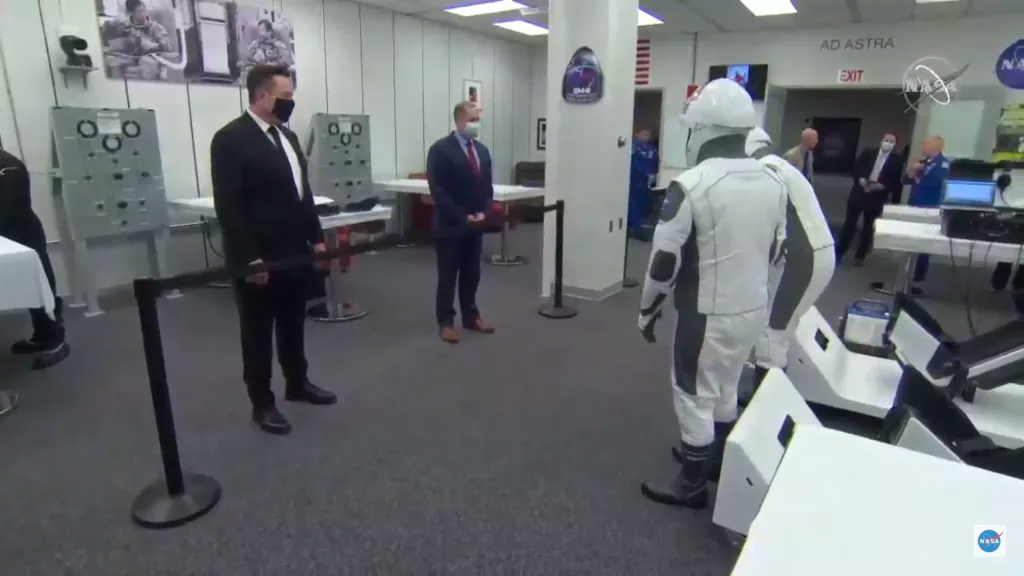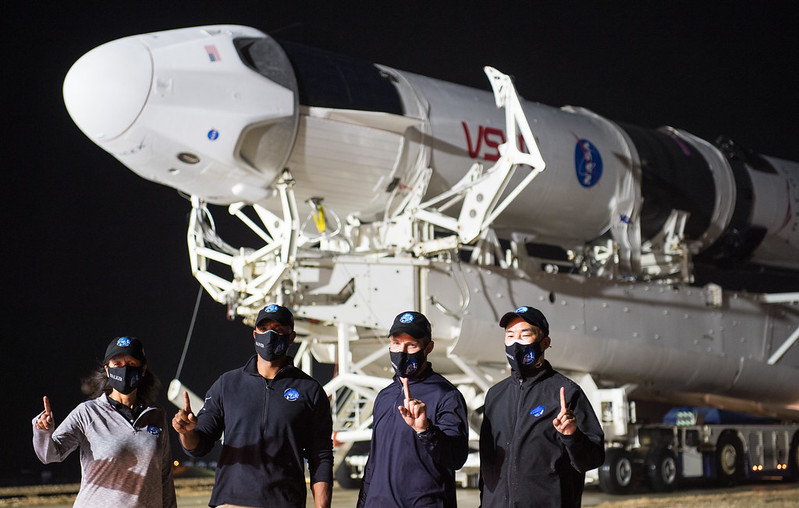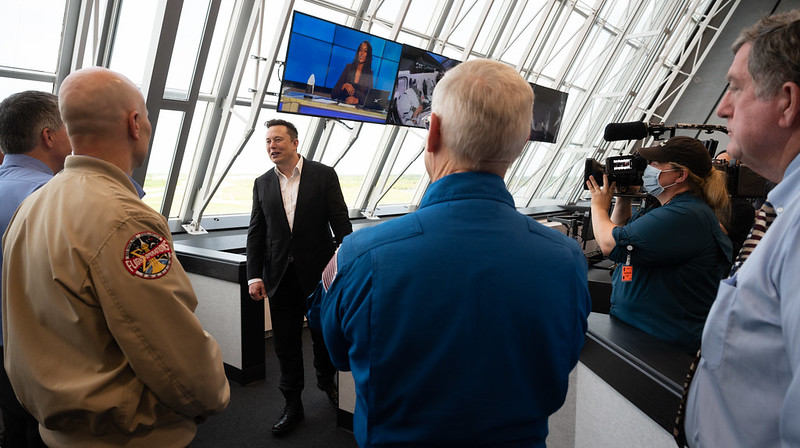SpaceX's Elon Musk says he's tested positive for COVID-19 on eve of NASA astronaut launch

With SpaceX on the eve of launching four astronauts to the International Space Station for NASA in a historic flight, CEO Elon Musk has announced that he has received mixed results from recent tests for the novel coronavirus..
Musk made the announcement on Twitter early today (Nov. 13). It's not yet clear what, if anything, those results might mean for SpaceX's Crew-1 launch with NASA, currently scheduled to lift off from the agency's Kennedy Space Center in Florida tomorrow night at 7:49 p.m. EST (0049 GMT on Nov. 15). NASA has been cautious about crew health since long before COVID-19 burst on the scene and has directed agency employees to work remotely as much as possible to slow the disease's spread.
"When somebody tests positive for COVID here at the Kennedy Space Center and across NASA, it is our policy for that person to quarantine and self-isolate, so we anticipate that that will be taking place," NASA Administrator Jim Bridenstine said during a news conference today when asked about tweets in which Musk said he had received both positive and negative tests. Bridenstine said he had talked to Musk two days ago, before the testing issue arose.
Live updates: SpaceX's Crew-1 astronaut launch for NASA
Related: NASA urges COVID caution for spectators of SpaceX Crew-1 launch
Something extremely bogus is going on. Was tested for covid four times today. Two tests came back negative, two came back positive. Same machine, same test, same nurse. Rapid antigen test from BD.November 13, 2020
"We're looking to SpaceX to do any contact-tracing that is appropriate," Bridenstine said. "Of course if there are changes that need to be made, we will look at those. But it's very early right now to know if any changes are necessary at this point."
Bridenstine emphasized that he is unaware of any contact between Musk and the four astronauts scheduled to ride Crew-1. NASA astronauts Mike Hopkins, Victor Glover and Shannon Walker and Japanese astronaut Soichi Noguchi are scheduled to remain in space for six and a half months, living and working on the International Space Station.
When asked whether the launch would be delayed if any contact between Musk and crewmembers was identified, Bridenstine declined to say. According to Steve Stich, program manager for NASA's Commercial Crew Program, speaking on Oct. 28, the crew entered "soft quarantine," when they could still remain at home with family, the weekend of Oct. 24 and Oct. 25 and was scheduled to enter a more stringent quarantine on Oct. 31.
Sign up for the Live Science daily newsletter now
Get the world’s most fascinating discoveries delivered straight to your inbox.
Related: SpaceX's Crew-1 astronaut mission in photos

"There's a lot to learn," he said. "Our astronauts have been in quarantine for weeks, and they should not have had contact with anybody. They should be in good shape."
When SpaceX's first crewed flight for NASA, dubbed Demo-2, first attempted launch on May 27, Musk visited NASA astronauts Doug Hurley and Bob Behnken with Bridenstine after the spaceflyers donned their suits and before they headed to the launch pad. Musk and Bridenstine wore masks and stood at a distance from the astronauts guided by a cordon. That launch was scrubbed due to weather; Musk did not visit them before their successful launch on May 30, although he was seen maskless (as were with others) in the launch control center at Kennedy Space Center.
Whether Musk now has COVID-19 is unclear.
"Was tested for covid four times today," Elon Musk wrote in a tweet posted in the wee hours today. "Two tests came back negative, two came back positive. Same machine, same test, same nurse. Rapid antigen test from BD."
In his tweet, Musk also wrote that the results indicated "something extremely bogus," but no diagnostic test, especially no rapid test, is perfect. Every testing method for every infection will produce a certain number of false positive and false negative detections: some number of positive tests when there is no infection and negative results when there is infection.
Symptoms of a typical cold. Nothing unusual so far.November 13, 2020
For the specific test Musk used, false positives are more likely when COVID-19 infection rates are low and false negatives are more likely when disease rates are high, according to materials about the test published by the Food and Drug Administration. That document also notes that the test is less reliable at detecting infections when a sample is taken more than five days into the illness.
In separate tweets, Musk wrote that he has had "Mild sniffles & cough & slight fever past few days," and no symptoms beyond those typical of a cold, so it isn't clear how far into the infection he would have been when the tested samples were gathered. In general, people begin showing symptoms about five days after exposure and are infectious for a day or two before showing symptoms.

Musk also wrote that he is getting PCR diagnostic tests as well but does not yet have those results. Although a polymerase chain reaction test is typically more accurate, it will still produce false negatives and more rarely, false positives.
Testing is a public health tool, not a certificate of personal safety; results are vital in helping officials grasp the status of a local outbreak. But the individual response to a negative test varies. "If a person has not had any known exposure to COVID-19 and is not experiencing symptoms, there is no need to quarantine if a test is negative," according to experts at the Johns Hopkins University School of Public Health. "If symptoms are present but a person has a negative COVID-19 test, that person should still follow home isolation recommendations." Isolation recommendations currently call for staying at home for 10 days with no contact with the outside world, according to the Centers for Disease Control and Prevention.
As of publication, SpaceX did not respond to a request for comment about Musk's current location, existing safety measures and any potential impacts to the launch.
You can watch SpaceX's Crew-1 launch for NASA live here at Space.com on Saturday beginning at 3:30 p.m. EST (1930 GMT).
Email Meghan Bartels at mbartels@space.com or follow her on Twitter @meghanbartels. Follow us on Twitter @Spacedotcom and on Facebook.
Meghan is a senior writer at Space.com and has more than five years' experience as a science journalist based in New York City. She joined Space.com in July 2018, with previous writing published in outlets including Newsweek and Audubon. Meghan earned an MA in science journalism from New York University and a BA in classics from Georgetown University, and in her free time she enjoys reading and visiting museums. Follow her on Twitter at @meghanbartels.










